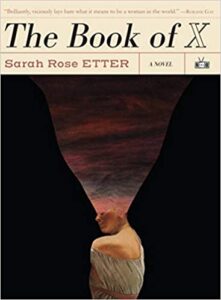The Book of X by Sarah Rose Etter ( Bookshop.org | Amazon.com )
Two Dollar Radio, 2019
ISBN-13: 978-1937512811
Available: Paperback, Kindle edition, audiobook
Cassie was born with a knot in her torso, a strange genetic mutation that has been carried on through generations of women in her family. The way she lives in and perceives her body, and the way other people react and interact with her because of her body, are also knotted together, in a way she can’t escape. Although her story is shaped by the grotesque, that is something true of most other women, too: the way they live in and perceive their bodies, and what others expect of them because of their bodies, can leave them trapped as well.
The way Cassie describes the realities of her daily life suggests that she is an unreliable narrator– her father makes money from mining from the meat quarry on their land- but what she describes– doing chores, shopping with her mother, hanging out with a friend, sitting through school– is banal. She has vivid, poetic visions of body parts: rivers of thighs, fields of throats, bodies sliced through at the torso, and her own stomach, flat instead of knotted. Her mother, who also has a knot, wants Cassie to disguise it with makeup, new clothes, and diet, feeding her rocks instead of ordinary food. Even the boy she likes doesn’t like her body because of the knot. Despite a painful experimental treatment, Cassie is unable to get rid of the knot that causes her physical and emotional pain. The meat that her father mines is bodiless, a place where she feels good about herself. But even that is taken from her when she is sexually assaulted in the meat quarry.
Cassie escapes to the city, where she can be anonymous. Even though people in the city don’t all know about her knot, they still have expectations. At her job she is expected to always be optimistic and cheerful, with a smiling face. When she takes a man back to her apartment and he sees her knot, he leaves. She is not defined by her knot in the same way that she was when everyone knew about it, but she is still trapped, this time by expectations of what a woman is supposed to appear like publicly as well as privately.
More autonomous that she used to be, she once again visits a doctor, but walks away from a supposed “new” treatment that appears identical to the one she has already gone through. Eventually she does find a doctor willing to do a complicated and painful surgery that would allow her torso to be unknotted, but it doesn’t leave her body, or her attitude, unmarked. She is still unable to endure the trauma of returning to her hometown, where she would have to see the physical pain her mother’s knot is causing her, revisit the scene of her sexual assault, and witness the “normal” existence of getting married and having a family that her best friend has. Even though the knot is no longer there, Cassie can’t see her body or self as being beautiful or worthy of love, and her self-loathing finally destroys her.
Had Etter taken a different path in telling Cassie’s story it would be bleak but not enthralling or horrific. But the surreal elements of Cassie’s environment (like the knot and the meat quarry), while very real to her, make the reader doubt the reality of the situation, coming back to the words more than once to be certain you understand. The Book of X, while giving us Cassie’s point of view of her own story, also embodies the difficult relationships and sometimes unreal feelings and perceptions that many women experience– and that is what makes it so disturbing and unforgettable. It’s no surprise that this book won the Shirley Jackson Award. Recommended.
Reader’s advisory note: Readers who enjoy the work of Carmen Maria Machado may also appreciate The Book of X.







Follow Us!